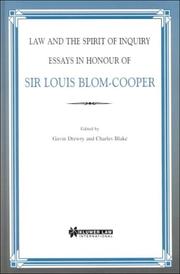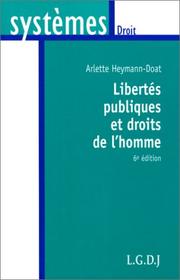Book
ISBN: 9212540627 9789212540627 Year: 1986
Abstract | Keywords | Export | Availability | Bookmark
 Loading...
Loading...Choose an application
- Reference Manager
- EndNote
- RefWorks (Direct export to RefWorks)
Basic rights --- Burgerrechten --- Civil liberties --- Civil rights --- Constitutional rights --- Droits civils --- Droits fondamentaux --- Fundamental rights --- Grondrechten --- Rights [Civil ] --- Désherbage --- Deselectie
Book
ISBN: 9780199754236 0199754233 Year: 2013 Publisher: New York : Oxford University Press,
Abstract | Keywords | Export | Availability | Bookmark
 Loading...
Loading...Choose an application
- Reference Manager
- EndNote
- RefWorks (Direct export to RefWorks)
Sexual rights --- Sex and law --- Droits sexuels --- Sexualité et droit --- History --- History --- Histoire --- Histoire --- American Civil Liberties Union.
Book
Year: 2000 Publisher: Lawrence, Kansas the University Press of Kansas
Abstract | Keywords | Export | Availability | Bookmark
 Loading...
Loading...Choose an application
- Reference Manager
- EndNote
- RefWorks (Direct export to RefWorks)
Jehovah's Witnesses --- religious persecution --- the Rights Revolution --- 1930s --- 1940s --- civil liberties --- America --- constitutional rights --- legal doctrine --- American constitutional law
Book
ISBN: 1526129582 9781526129581 9780719085178 Year: 2017 Publisher: Manchester, UK : Manchester University Press,
Abstract | Keywords | Export | Availability | Bookmark
 Loading...
Loading...Choose an application
- Reference Manager
- EndNote
- RefWorks (Direct export to RefWorks)
Issues around the policing of public order and political expression are as topical today as in the past, and are likely to remain so in the future.Janet Clark explores the origins of the National Council for Civil Liberties (the precursor to Liberty) that emerged in 1934 in protest at the policing of political extremes. The book deals with police attempts to discredit the NCCL and the use of intelligence to perpetuate a view of the organisation as a front for the Communist Party. It also examines the state and police responses to this organised criticism of police powers. This book is essential reading for students and lecturers studying British social history, the development of civil liberties and of policing in Britain, as well as anyone interested in this enduring topic. Included is a foreword by Clive Emsley, Emeritus Professor in History at the Open University, and widely regarded as the doyen of police history. "Public interest is no less exercised in the twenty-first century by civil liberties, police powers and the policing of public order than it was in the 1930s, or indeed a century earlier. The National Council for Civil Liberties (the precursor to civil rights organization Liberty) emerged in 1934 in protest at the policing of political expression. Historians have written extensively about public order, political extremism and the authorities and subversion in the interwar period but hitherto missing from this discourse is the account of the NCCL's role. Janet Clark explores the origins of the NCCL, its political orientation, and the political and personal agendas of its supporters. She argues that changing forms of political expression and divisive party politics played a noteworthy role in the momentum for a civil liberties pressure group. At the same time, the narrative deals with police attempts to discredit the NCCL and the use of surveillance and intelligence in perpetuating a view of the organisation as a front for the communist party. Distinctly, it examines the response of the state to this organised criticism of police methods and to the emergence of a civil rights movement. A concise account of the development of civil liberties in Britain, this book is essential reading for students and lecturers in the study of British social history, the historical development of civil liberties and of policing in Britain as well as anyone interested in this enduring topic. Included is a foreword by Clive Emsley, Emeritus Professor in History at the Open University, and widely regarded as the doyen of police history." --Back cover.
Public policy (Law) --- Civil rights --- Ordre public --- Public order --- Law --- Basic rights --- Civil liberties --- Constitutional rights --- Fundamental rights --- Rights, Civil --- Constitutional law --- Human rights --- Political persecution --- History --- Law and legislation --- Great Britain. --- National Council for Civil Liberties (Great Britain) --- NCCL (National Council for Civil Liberties) --- National Council for Civil Liberties, London --- National Council for Civil Liberty (Great Britain) --- Liberty (Great Britain) --- Council for Civil Liberties (Great Britain) --- London Metropolitan Police --- Scotland Yard --- New Scotland Yard --- Metropolitan Police Office (Great Britain) --- Metropolitan Police Force (Great Britain) --- Metropolitan Police (Great Britain) --- History. --- Police power --- Politics --- Constitution: Government & The State --- POLITICAL SCIENCE / Political Ideologies / General --- Constitution: government & the state --- Administrative law --- Municipal corporations --- Political science --- Right of property --- Criminal Investigation Department. --- Home Office. --- Liberal Internationalism. --- National Council for Civil Liberties. --- Ronald Kidd. --- Special Branch. --- civil liberties. --- non-party ideology. --- pacifist groups. --- plain clothes police officers. --- policing. --- political expression. --- political extremes. --- pressure group. --- public attention. --- public order. --- women's organisations.
Book
ISBN: 0674974689 0674974700 9780674974708 9780674545717 0674545710 Year: 2017 Publisher: Cambridge, MA
Abstract | Keywords | Export | Availability | Bookmark
 Loading...
Loading...Choose an application
- Reference Manager
- EndNote
- RefWorks (Direct export to RefWorks)
In the early decades of the twentieth century, business leaders condemned civil liberties as masks for subversive activity, while labor sympathizers denounced the courts as shills for industrial interests. But by the Second World War, prominent figures in both camps celebrated the judiciary for protecting freedom of speech. In this strikingly original history, Laura Weinrib illustrates how a surprising coalition of lawyers and activists made judicial enforcement of the Bill of Rights a defining feature of American democracy. The Taming of Free Speech traces our understanding of civil liberties to conflict between 1910 and 1940 over workers’ right to strike. As self-proclaimed partisans in the class war, the founders of the American Civil Liberties Union promoted a bold vision of free speech that encompassed unrestricted picketing and boycotts. Over time, however, they subdued their rhetoric to attract adherents and prevail in court. At the height of the New Deal, many liberals opposed the ACLU’s litigation strategy, fearing it would legitimize a judiciary they deemed too friendly to corporations and too hostile to the administrative state. Conversely, conservatives eager to insulate industry from government regulation pivoted to embrace civil liberties, despite their radical roots. The resulting transformation in constitutional jurisprudence—often understood as a triumph for the Left—was in fact a calculated bargain. America’s civil liberties compromise saved the courts from New Deal attack and secured free speech for labor radicals and businesses alike. Ever since, competing groups have clashed in the arena of ideas, shielded by the First Amendment.
Freedom of speech --- Employee rights --- Civil rights --- Labor movement --- Basic rights --- Civil liberties --- Constitutional rights --- Fundamental rights --- Rights, Civil --- Constitutional law --- Human rights --- Political persecution --- Employees --- Labor rights --- Rights of employees --- Labor laws and legislation --- Employee rules --- Free speech --- Liberty of speech --- Speech, Freedom of --- Freedom of expression --- Assembly, Right of --- Freedom of information --- Intellectual freedom --- History --- Law and legislation --- American Civil Liberties Union. --- National Civil Liberties Bureau (U.S.) --- A.C.L.U. --- ACLU --- Organización Americana de Libertades Civiles
Dissertation
ISBN: 9067500356 Year: 1998 Publisher: Leiden Stichting NJCM-Boekerij
Abstract | Keywords | Export | Availability | Bookmark
 Loading...
Loading...Choose an application
- Reference Manager
- EndNote
- RefWorks (Direct export to RefWorks)
Human rights --- Netherlands --- Civil rights --- -Basic rights --- Civil liberties --- Constitutional rights --- Fundamental rights --- Rights, Civil --- Constitutional law --- Political persecution --- History --- Law and legislation --- Theses --- History. --- -History --- Basic rights
Book
ISBN: 0444855971 9780444855978 Year: 1983 Publisher: Amsterdam Noord-Hollandsche uitgeversmaatschappij
Abstract | Keywords | Export | Availability | Bookmark
 Loading...
Loading...Choose an application
- Reference Manager
- EndNote
- RefWorks (Direct export to RefWorks)
Human rights --- #GBIB:CBMER --- Civil rights --- Civil rights. --- Netherlands. --- Basic rights --- Civil liberties --- Constitutional rights --- Fundamental rights --- Rights, Civil --- Constitutional law --- Political persecution --- Law and legislation

ISBN: 9041197613 Year: 1999 Publisher: The Hague London Boston Kluwer Law International
Abstract | Keywords | Export | Availability | Bookmark
 Loading...
Loading...Choose an application
- Reference Manager
- EndNote
- RefWorks (Direct export to RefWorks)
Basic rights --- Burgerrechten --- Civil liberties --- Civil rights --- Constitutional rights --- Droits civils --- Droits fondamentaux --- Fundamental rights --- Grondrechten --- Rights [Civil ] --- Constitutional law --- Criminal law --- Law

ISBN: 0902352210 Year: 1982 Publisher: London Polonia book fund
Abstract | Keywords | Export | Availability | Bookmark
 Loading...
Loading...Choose an application
- Reference Manager
- EndNote
- RefWorks (Direct export to RefWorks)
Civil rights --- Droits de l'homme --- -Basic rights --- Civil liberties --- Constitutional rights --- Fundamental rights --- Rights, Civil --- Constitutional law --- Human rights --- Political persecution --- Law and legislation --- -Civil rights

ISBN: 2275019375 Year: 2000 Publisher: Paris LGDJ
Abstract | Keywords | Export | Availability | Bookmark
 Loading...
Loading...Choose an application
- Reference Manager
- EndNote
- RefWorks (Direct export to RefWorks)
Civil rights --- Droits de l'homme --- -Basic rights --- Civil liberties --- Constitutional rights --- Fundamental rights --- Rights, Civil --- Constitutional law --- Human rights --- Political persecution --- Law and legislation --- -Civil rights

 Search
Search Feedback
Feedback About UniCat
About UniCat  Help
Help News
News